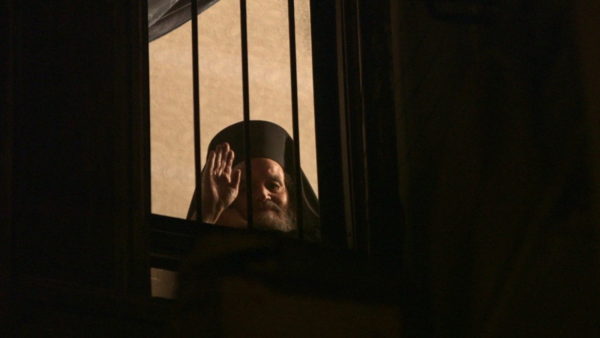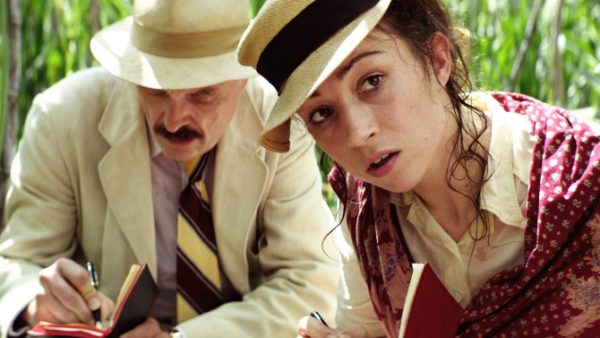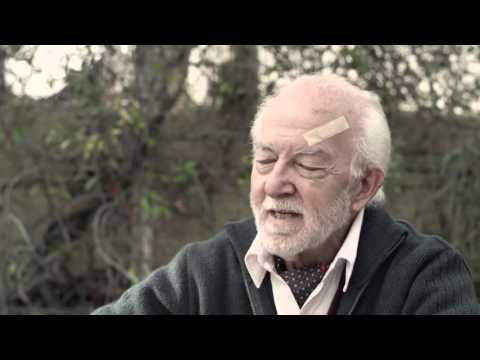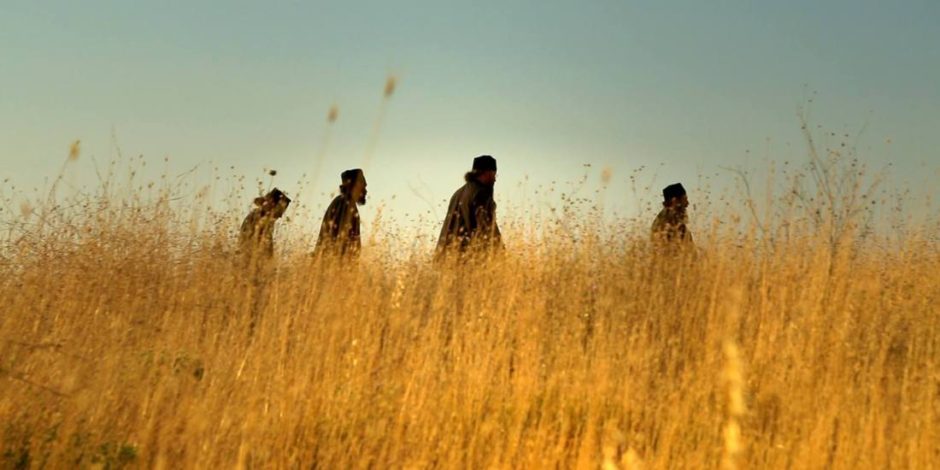This year’s edition of the Toronto Jewish Film Festival, rebranded as the Toronto Jewish Film Foundation, runs from May 4-14. As usual, the lineup is impressive. The films reviewed here deal with a scandal in the powerful Greek Orthodox Church in Israel, the Austrian novelist and refugee from Nazism, Stefan Zweig, and a Polish veteran of the Spanish Civil War who relives his youth vicariously through memory.
A scandal of immense proportions erupted in the Greek Orthodox church in East Jerusalem in 2005 when a major Israeli daily reported that its patriarch, Irineos, had sold land to Jewish settlers close to the Jaffa Gate. Since virtually all of the church’s followers in Israel, the West Bank, the Gaza Strip and Jordan are Palestinian Arabs, he was branded as a traitor. Irineos strenuously denied the accusation, but in short order he was stripped of his title, demoted to simple monk and confined to his room for the next 11 years.

The incident, the first of its kind in the church’s 2,000-year history, sharply divided the 100,000-strong Greek Orthodox community. For some, Irineos was a villain who had betrayed the Palestinians. For others, he was nothing less than a martyr, the victim of an opaque conspiracy.
These diametrically conflicting views intrigued Israeli filmmaker Danae Elon sufficiently enough for her to embark on a quest to find the truth. She interviewed, among others, pro-and anti-Irineos figures in Israel and Greece, the police chief of Jerusalem, a former Israeli prime minister, Irineous’ successor, Theophilus III, and Irineos himself. Her compelling documentary, Patriarch’s Room (May 12 & May 14), is a gallant attempt to unravel the mystery.
When the story of Irineous’ “betrayal” broke, many of his congregants were absolutely livid. “He’s Judas!” one man exclaimed. “He betrayed Jesus Christ!” Irineous protested his innocence, but to no avail. Locked up in his quarters in the Greek Orthodox patriarchy, he was, in effect, internally exiled. A local Palestinian grocer, whom Elon interviews, supplied him with food for a while.
Brandishing a microphone, she conducts an impromptu interview with Irineous from his window. He claims that “bad people” conspired against him. The new patriarch, Theophilus, declines to discuss the details of Irineous’ demotion, but suggests that his predecessor failed to understand the dynamics of the Arab-Israeli conflict.
Elon flies to Greece to speak to monks in a monastery loyal to Irineous, who still regards himself as the rightful patriarch. One of his acolytes, known as “Little Irineous,” is intent on restoring him to his throne. As the film unfolds, “Little Irineous” joins Elon in Israel for further conversations. Back in Jerusalem, she speaks to police chief Avi Biton, who says that Irineous is free to leave his room whenever he likes.
At this juncture, “Little Irineous” discloses some vital information. As he and Elon stand on high ground overlooking the city, he discloses that the church owns about half the land in Jerusalem and environs, including the residence of Israel’s president. Indeed, the church is the third largest private land owner in the country.
As she continues to probe, she tries to obtain an interview with Mati Dan, one of the principals of Ateret Cohanim, an organization dedicated to buying Arab land in East Jerusalem on a clandestine basis. Dan is unavailable, of course, but she discovers that a high-level employee of the church secretly negotiated a land deal with him without Irineous’ knowledge. When Irineous discovered what had happened, he refused to sign the real estate deal, prompting headlines in Israeli newspapers.
Elon also interviews Irineous’ rival, Bishop Timothy, who admits he played a role in his ouster.
The Israeli government waited two years before recognizing Theophilus as the 142nd patriarch. Ehud Olmert, the former Israeli prime minister, says Theophilus was so eager for Israeli recognition that he was ready to become a member of the Likud Party. It’s a facetious comment, but it shows the lengths to which the new patriarch was willing to go to curry favor with Israel.
Rfai Eitan, a former Israeli cabinet minister, sheds more light on the issue. Israel, he reveals, was favorably disposed toward Theophilus out of fear that an Arab might be next in line to succeed Irineous as patriarch.

Elon’s first face-to-face interview with Irineous is heart-felt. “Help us, please,” he says as she enters his richly-appointed apartment. She’s sympathetic to his claim that unnamed officials in the Israeli government pressed him to sell the land. “I could not help but feel for him,” she says.
But at the end of the day, she acknowledges, only time will reveal all the details of this convoluted case.
Stefan Zweig, one of the world’s most famous writers, found himself in exile after Germany annexed Austria, his birthplace, in 1938. A novelist, playwright and journalist, he could not, as a Jew, return to Vienna. So he became a rootless cosmopolitan in search of a permanent home, a quest he cut terribly short with suicide in 1942 in Brazil.
Maria Schrader’s film, Stefan Zweig: Farewell To Europe (May 5 & May 9), unfolds in chapters as he and his second wife, Lotte, traverse the globe, moving successively from Britain, Brazil, New York City and back to Brazil. Their peregrinations unfold against the backdrop of World War II.
The movie opens in Rio de Janeiro as the Brazilian foreign minister pays tribute to Zweig (Josef Hader) at a lavish lunch. He returns the favor by saying he’s found friendship and tolerance in Brazil. A flashback takes us back to Buenos Aires, circa 1936. At a press conference, he declines to criticize the Nazi regime in Germany and claims that national borders and passports will be obsolete one day.
Fast-forwarding to 1941, we find Zweig walking through a dense sugarcane field in Brazil’s Bahia province. He and his much younger wife (Aenne Schwarz) are constantly in motion, travelling one from city to the next to meet adoring crowds. In one town, he’s feted by the mayor and greeted by a band that comically mangles the Austrian national anthem.

In New York City, in the dead of winter, Zweig is in a complaint mode. He’s tired of arranging visas for old friends who can’t leave Germany. In a fatigued voice, he says he can’t go on like this much longer. But he continues to think of old friends stranded in Europe.
Returning to Brazil, he finds himself in Petropolis, a town in the mountains relatively close to Rio. He meets a friend, a former newspaper editor from Berlin, and both admire the lush jungle views. “We have no reason to complain,” says Zweig, not letting on he’s beset by depression. An admirer gives him a dog, which brings a smile to his face.
The final chapter of this somber film encapsulates Zweig’s tragedy. Discouraged by his personal prospects, and worn down by a grinding war that was destroying Europe, he could no longer see the purpose of life.
Alejandro Magnone’s drama, Subte: Polska (May 6 & May 14), revolves around Tadeusz Goldberg (Hector Bidonde), a 90-year-old Polish Jewish veteran of the Spanish Civil War living in Buenos Aires. As he glances back in time, he compares the frailties of old age with his youthful sexual encounters. This juxtaposition, a source of pride and frustration, renders him crotchety and bold. He complains his pills aren’t effective any more. He says he’s open to taking Viagara. He stresses the importance of having an erection, much to the bemusement of the doctors attending to him at a hospital.
As the days pass, he shows off his mental prowess in chess, a game in which he was once a champion. And he visits the grave of a friend who fought alongside him in Spain.
Spain is the leitmotif that runs through this contemplative Argentinian film. In a series of flashbacks, Goldberg’s experiences in Spain, particularly his love affair with a young Spanish woman, appear and reappear. Goldberg’s mind also races back to his early years in Buenos Aires when he was a subway worker.

As he reminisces, he talks about a girlfriend in Poland whom he lost touch with long ago and explains why, as a Jew and a communist, he was unable to return to Poland in the late 1930s. Recalling the murder of his family during the Holocaust, Goldberg says he settled in Argentina to banish this tragedy from his thoughts.
Subte: Polska reminds viewers that past and present do not necessarily coexist harmoniously.
